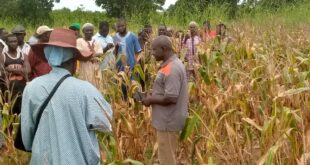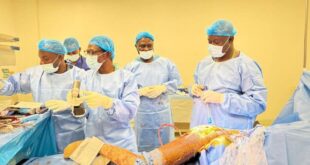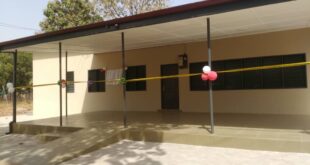Sagnarigu, Ghana – A senior project manager of the Electronic Waste Management in Ghana (E-MAGIN) project, Professor Daniel Agyapong, has urged scrap and electronic waste collectors to formalize their businesses for optimum gain.
According to him, scrap and e-waste collectors would be able to access certain opportunities such as grants and loans as well as support from the government and local assemblies in the area of tax, permit and license acquisition so easily when they formalize their activities.
In an interview with Savannah News after a day’s round table discussion at Sagnarigu in the Northern Region on Wednesday, Professor Agyapong said, business owners who formalize their activities often do not get harassed by regulatory institutions.
“The round table discussion was to discuss challenges and prospects associated with e-waste businesses in the Northern Region which employs about 500 people in Tamale, Sagnarigu and their environs. This means that this sector is a key driver of job creation, income as well as livelihood. It is therefore important that these businesses are adequately engaged so as to see how together challenges confronting them can be resolved”, the senior lecturer at the University of Cape Coast (UCC) explained.
The discussion brought together officials of Assemblies and Environmental Protection Agency as well as executives of the Northern Scrap Dealers Association (NoSDA); Ghana Electronics Servicing and Technicians Association (GESTA); and the National Air-condition and Refrigeration Workshop Owners Association (NARWOA).
Funded by the European Union, the 48-month E-MAGIN project is being implemented under the EU’s SWITCH Africa Green program (phase II). It targets eight regions including Greater Accra, Ashanti, old Brong Ahafo, Western, Eastern, Central, Northern and the Volta Region.
E-MAGIN’s overall objective is to improve management of e-waste in Ghana towards sustainable consumption and production through an integrated multi-stakeholder approach, thus promoting sustainable growth, alleviating poverty, increasing human well-being and preventing environmental pollution.
More specifically, the project seeks to contribute to the effective implementation of the Ghana Hazardous and Electronic Waste Control and Management Act, Act 917 by implementing a number of integrated work packages. For instance, it seeks amongst others to improve the knowledge base on e-waste management in Ghana by taking a closer look at the sector’s value chain, and also foster formalization of informal Micro, Small and Medium-sized Enterprises, thus enabling them to continue operating under the legal ambit of Act 917.
On a yearly basis, E-MAGIN would provide training to members of the various associations on ideas that would help them to grow their business and also guard themselves against hazards associated with their business.
Meanwhile, scrap collectors at the discussion unanimously agreed that the lack of a designated market for them to do their business was seriously affecting them.
They said difficulty in getting a vehicle to cart their scraps to Kumasi or Accra is another challenge that they are confronted with.
Moreover, they complained about having to climb more than one weighing scale whenever any scrap dealer is transporting scraps to Kumasi or Accra. In their view, paying at every weighing scale is very detrimental to the fortunes of their business.
Mr. Mohammed Abdulai, Secretary to the Northern Scrap Dealers Association, therefore appealed to the Tamale Metropolitan Assembly to support them by allocating a land for all scrap and e-waste collectors to relocate their businesses there for easy access to customers and regulation of their activities by the former and EPA.
But Professor Agyapong assured that all concerns and suggestions raised during the discussion would later be tabled at a national policy dialogue with the Ministry of Environment, Science, Technology and Innovation and other stakeholders where solutions would be proffered to each of them.
By SavannahNewsOnline.Com/Philip Liebs
 Savannah News Online Reporting Only What Matters Most
Savannah News Online Reporting Only What Matters Most



